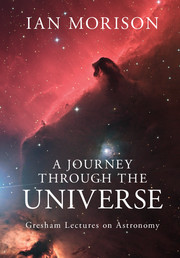Book contents
- Frontmatter
- Dedication
- Contents
- Preface
- Acknowledgements
- 1 Watchers of the skies
- 2 Our Sun
- 3 Aspects of our Solar System
- 4 The rocky planets
- 5 The hunt for Planet X
- 6 Voyages to the outer planets
- 7 Harbingers of doom
- 8 Impact!
- 9 Four hundred years of the telescope
- 10 The family of stars
- 11 Aging stars
- 12 The search for other worlds
- 13 Are we alone? The search for life beyond the Earth
- 14 Our island Universe
- 15 Wonders of the southern sky
- 16 Proving Einstein right
- 17 Black holes: no need to be afraid
- 18 It’s about time
- 19 Hubble’s heritage: the astronomer and the telescope that honours his name
- 20 The violent Universe
- 21 The invisible Universe: dark matter and dark energy
- 22 The afterglow of creation
- 23 To infinity and beyond: a view of the cosmos
- Index
- Plate section
- References
7 - Harbingers of doom
Published online by Cambridge University Press: 05 October 2014
- Frontmatter
- Dedication
- Contents
- Preface
- Acknowledgements
- 1 Watchers of the skies
- 2 Our Sun
- 3 Aspects of our Solar System
- 4 The rocky planets
- 5 The hunt for Planet X
- 6 Voyages to the outer planets
- 7 Harbingers of doom
- 8 Impact!
- 9 Four hundred years of the telescope
- 10 The family of stars
- 11 Aging stars
- 12 The search for other worlds
- 13 Are we alone? The search for life beyond the Earth
- 14 Our island Universe
- 15 Wonders of the southern sky
- 16 Proving Einstein right
- 17 Black holes: no need to be afraid
- 18 It’s about time
- 19 Hubble’s heritage: the astronomer and the telescope that honours his name
- 20 The violent Universe
- 21 The invisible Universe: dark matter and dark energy
- 22 The afterglow of creation
- 23 To infinity and beyond: a view of the cosmos
- Index
- Plate section
- References
Summary
Comets can provide some of the most beautiful sights in our heavens, as that of Comet Hale–Bopp seen in Figure 7.1, but in ancient times, before their true nature was known, were often feared. Aristotle proposed that comets were gaseous phenomena in the upper atmosphere that occasionally burst into flames. He depicted comets as ‘stars with hair’ and used the Greek word ‘kometes’ to refer to them, from the root ‘kome’ meaning ‘head of hair’. They were regarded as bad omens foretelling catastrophe or the deaths of kings.
Tycho Brahe made careful observations of the comet of 1577 and, by measuring its position from well-separated locations, was able to show that it lay at least four times further away than the Moon. In 1687, Isaac Newton was able to show that the path of a bright comet observed through the winter of 1680/1 could be fitted to a parabolic orbit with the Sun at one focus. He had thus shown that comets were Solar System bodies orbiting the Sun.
Information
- Type
- Chapter
- Information
- A Journey through the UniverseGresham Lectures on Astronomy, pp. 91 - 99Publisher: Cambridge University PressPrint publication year: 2014
